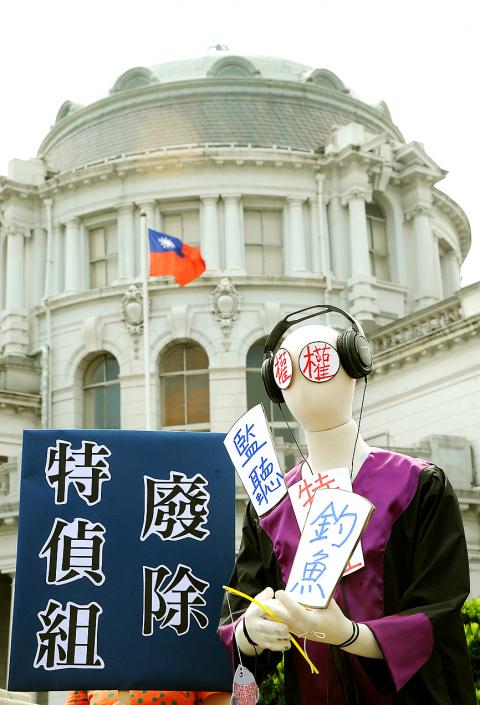The minister of justice could be ready to abolish the Supreme Prosecutors’ Office’s Special Investigation Division (SID), which has been embroiled in a number of high-profile controversies, and the move might come later this year if the law is changed.
Minister of Justice Chiu Tai-san (邱太三) appears to have given his blessing when he responded to a written statement by Democratic Progressive Party (DPP) Legislator Tsai Yu-yi (蔡易餘), who demanded that the SID be scrapped for political interference and a lack of checks and balances to guard against abuse of its investigative powers.
The Ministry of Justice gave Tsai a written reply, in which it recommended that the Legislative Yuan scrap Article 63, Item 1 of the Organic Act of Courts (法院組織法), which was the legal basis for the SID’s establishment in 2007.

Photo: Liu Hsin-de, Taipei Times
Tsai yesterday confirmed that he had received the statement and said he had initiated the amendment and gathered support from fellow DPP legislators.
“We will request that the DPP legislative caucus make this amendment a priority for deliberation at the upcoming legislative session starting next month. If this is done, we could get it through a third reading by October at the earliest,” Tsai told reporters.
However, Deputy Minister of Justice Chen Ming-tang (陳明堂) said Chiu was responding to questions by a legislator by providing his opinion and analysis, rather than announcing an official decision.
“The ministry is handling this issue very carefully, and we are reviewing all aspects of consideration regarding the SID. We have not made any equivocal decision on the future of the SID,” Chen said.
Prosecutor-General Yen Ta-ho (顏大和) and SID spokesman Kuo Wen-tung (郭文東) said they had no opinion on the matter.
The SID was set up to investigate corruption and major crimes by high-level government officials, such as the corruption probe against former president Chen Shui-bian (陳水扁), and has been involved in several controversial cases, such as the wiretapping of telephone conversations between then-legislative speaker Wang Jin-pyng (王金平) and DPP caucus whip Ker Chien-ming (柯建銘).
“The SID was subverted by then-president Ma Ying-jeou (馬英九) to allow him to politically manipulate the judiciary. It has been embroiled in too many cases that had political motives in its selective prosecution. The public has lost trust in this body, and therefore it is time to abolish it,” Tsai said.
Legal experts have criticized the SID and called for the abolition of the body, saying it is illegitimate, unconstitutional and creates problems for the prosecutorial system.
“The SID has failed to accomplish its mission of probing corruption cases involving high-ranking government officials,” lawyer Cheng Wen-lung (鄭文龍) said. “It chose to selectively prosecute ex-president Chen and officials in past DPP administrations.”
Cheng said the SID is a malfunctioning body, that it infringes on the Constitution and that it has been used as a tool by politicians to pursue their political agenda.

DAREDEVIL: Honnold said it had always been a dream of his to climb Taipei 101, while a Netflix producer said the skyscraper was ‘a real icon of this country’ US climber Alex Honnold yesterday took on Taiwan’s tallest building, becoming the first person to scale Taipei 101 without a rope, harness or safety net. Hundreds of spectators gathered at the base of the 101-story skyscraper to watch Honnold, 40, embark on his daredevil feat, which was also broadcast live on Netflix. Dressed in a red T-shirt and yellow custom-made climbing shoes, Honnold swiftly moved up the southeast face of the glass and steel building. At one point, he stepped onto a platform midway up to wave down at fans and onlookers who were taking photos. People watching from inside

A Vietnamese migrant worker yesterday won NT$12 million (US$379,627) on a Lunar New Year scratch card in Kaohsiung as part of Taiwan Lottery Co’s (台灣彩券) “NT$12 Million Grand Fortune” (1200萬大吉利) game. The man was the first top-prize winner of the new game launched on Jan. 6 to mark the Lunar New Year. Three Vietnamese migrant workers visited a Taiwan Lottery shop on Xinyue Street in Kaohsiung’s Gangshan District (崗山), a store representative said. The player bought multiple tickets and, after winning nothing, held the final lottery ticket in one hand and rubbed the store’s statue of the Maitreya Buddha’s belly with the other,

‘NATO-PLUS’: ‘Our strategic partners in the Indo-Pacific are facing increasing aggression by the Chinese Communist Party,’ US Representative Rob Wittman said The US House of Representatives on Monday released its version of the Consolidated Appropriations Act, which includes US$1.15 billion to support security cooperation with Taiwan. The omnibus act, covering US$1.2 trillion of spending, allocates US$1 billion for the Taiwan Security Cooperation Initiative, as well as US$150 million for the replacement of defense articles and reimbursement of defense services provided to Taiwan. The fund allocations were based on the US National Defense Authorization Act for fiscal 2026 that was passed by the US Congress last month and authorized up to US$1 billion to the US Defense Security Cooperation Agency in support of the

‘COMMITTED TO DETERRENCE’: Washington would stand by its allies, but it can only help as much as countries help themselves, Raymond Greene said The US is committed to deterrence in the first island chain, but it should not bear the burden alone, as “freedom is not free,” American Institute in Taiwan Director Raymond Greene said in a speech at the Institute for National Defense and Security Research’s “Strengthening Resilience: Defense as the Engine of Development” seminar in Taipei yesterday. In the speech, titled “Investing Together and a Secure and Prosperous Future,” Greene highlighted the contributions of US President Donald Trump’s administration to Taiwan’s defense efforts, including the establishment of supply chains for drones and autonomous systems, offers of security assistance and the expansion of